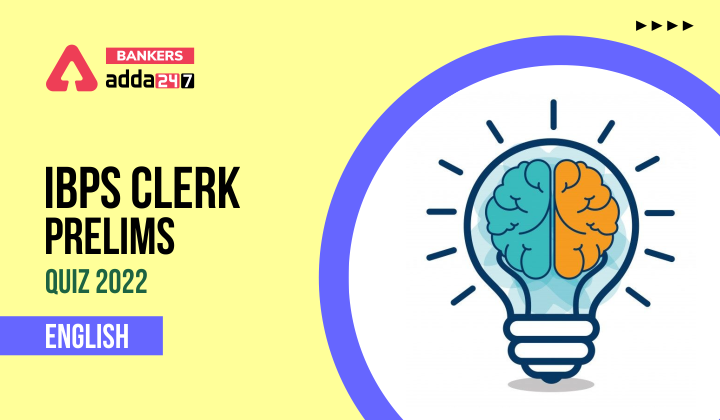
TOPIC : Miscellaneous
Directions (1-5): Rearrange the following six sentences (A), (B), (C), (D),(E) and (F) in the proper sequence to form a meaningful paragraph, then answer the questions given below them.
(A) India has had a higher rank in previous versions of these rankings.
(B)These findings have created an impression that the prevalence of hunger has increased in India in recent years.
(C) A closer looks at the numbers suggests that such conclusions are unwarranted.
(D)To start with, the numbers reflect under-nutrition rather than hunger.
(E)And even on that score, India’s performance, as measured by IFPRI, has been improving over the past decade although its nutritional indicators still appear poor compared to those of its peers.
(F) The Washington-based International Food Policy Research Institute (IFPRI) has ranked India at the 100th position among 119 countries in its 2017 Global Hunger Index (GHI) rankings.
Q1. Which of the following should be the FIRST sentence?
(a) A (b) B (c) C (d) D (e) F
Q2. Which of the following should be the SECOND sentence?
(a) A (b) B (c) C (d) D (e) E
Q3. Which of the following should be the THIRD sentence?
(a) A (b) B (c) C (d) D (e) F
Q4. Which of the following should be the FOURTH sentence?
(a) A (b) B (c) C (d) D (e) E
Q5. Which of the following should be the SIXTH (LAST) sentence?
(a) A (b) B (c) C (d) D (e) E
Directions (6-10): Each question below has two blanks, each blank indicating that something has been omitted. Choose the set of words for each blank which best fits the meaning of the sentence as a whole.
Q6. Small business owners _________ rely on banks for funding, but banks face more stringent regulatory requirements that have _________ lending and made loans harder to obtain.
(a) Vigorously, free
(b) Peacefully, modified
(c) Combatively, defined
(d) Overwhelmingly, restricted
(e) Extremely, reduced
Q7. The economic reforms ___________ in 1991 brought about expansion of the services sector helped largely by a liberalised ____________ and trade regime.
(a) Kick-started, investment
(b) Appeared, disinvestment
(c) Commenced, disinvestment
(d) Fastened, investment
(e) Hampered, disinvestment
Q8. A/An ___________ of the US sub-prime mortgage market and the reversal of the housing boom in other industrialized economies have had a _________ effect around the world.
(a) Disintegration, rhythm
(b) Debacle, crimpy
(c) Collapse, ripple
(d) Failure, rhythm
(e) Integration, ripple
Q9. Despite the government crackdown on liberal academia, opposition, media and social networks, Turkey still has a _____________public sphere where anti-Erdoganism is a common theme for____________ people.
(a) Advancing, organising
(b) Failing, mobilising
(c) Burgeoning, preparing
(d) Flourishing, assembling
(e) Thriving, mobilizing
Q10. Ironically the cow, instead of representing the best of agricultural values, _______________ the tension between a changing caste system and the______________ of a constitutional India.
(a) Enhances, symbols
(b) Decreases, models
(c) Embodies, ideals
(d) Enhances, symbols
(e) Improves, ideals
Directions (11-15): Read each sentence to find out whether there is any grammatical or idiomatic error in it. The error, if any, will be in one part of the sentence. The number of that part is the answer. If there is ‘No error’, the answer is (e). (Ignore errors of punctuation, if any.)
Q11. He asked me (a)/ why had I gone to the cinema (b)/ late at night in spite of (c)/ his clear instructions. (d)/ No Error. (e)
(a) a
(b) b
(c) c
(d) d
(e) e
Q12. The Director knowing of my (a)/ interest in Environmental Science (b)/ asked me that I would (c)/ like to attend the National Seminar. (d)/ No Error. (e)
(a) a
(b) b
(c) c
(d) d
(e) e
Q13. When the mother saw (a)/ a bull coming towards the children (b)/ she cried out (c)/ and ask them to run away. (d)/ No Error. (e)
(a) a
(b) b
(c) c
(d) d
(e) e
Q14. The youngest princess took (a)/ her father’s hand in hers (b)/ and simply said that (c)/ she loves her more than him. (d)/ No Error. (e)
(a) a
(b) b
(c) c
(d) d
(e) e
Q15. She said that (a)/ she would not tell (b)/ anything until she (c)/ has heard the facts. (d)/ No Error. (e)
(a) a
(b) b
(c) c
(d) d
(e) e
Solutions:
S1. Ans.(e)
Sol. The correct sequence is FABCDE
S2. Ans.(a)
Sol. The correct sequence is FABCDE
S3. Ans.(b)
Sol. The correct sequence is FABCDE
S4. Ans.(c)
Sol. The correct sequence is FABCDE
S5. Ans.(e)
Sol. The correct sequence is FABCDE
S6. Ans. (d);
Sol. Overwhelmingly- Overpowering in effect or strength.
Restricted– Kept within certain limits.
S7. Ans. (a);
Sol. Kick-started– provide an impetus to start or resume (a process)
Investment- the action or process of investing money for profit.
S8. Ans. (c);
Sol. Collapse- (of a structure) suddenly fall down or give way.
Ripple- something that looks like a wave.
S9. Ans. (e);
Sol. Thriving- prosperous and growing; flourishing.
Mobilising- make (something) movable or capable of movement.
S10. Ans. (c);
Sol. Embodies- be an expression of or give a tangible or visible form to (an idea, quality, or feeling).
Ideals- a standard or principle to be aimed at.
S11. Ans. (b)
Sol. ‘why I had’ will be used in place of ‘why had I’ as reported speech is assertive (subject+ verb) in indirect narration of interrogative sentence.
S12. Ans. (c)
Sol. Use ‘if’ or ‘whether’ in place of ‘that’ because if yes/ no- question is used in reported speech of direct narration, then ‘if’ or ‘whether’ is used in reported speech of indirect narration. Example:
Direct: He said to me, ‘Will you do it for me?’
Indirect: He asked me if/ whether I would do it for him.
S13. Ans. (d)
Sol. ‘asked’ will be used in place of ‘ask’ as ‘she cried out’ is in past, hence ‘cried out and asked them’ is used.
S14. Ans. (d)
Sol. ‘loved’ is the correct use as if the reporting speech of the sentence is in past tense, then reported speech is also used in past tense.
S15. Ans. (d)
Sol. ‘had’ will be used in place of ‘has’ as reporting speech ‘she said’ is in past tense and hence reported speech should also be used in past tense.




 English Quizzes For SBI PO Mains 2023 - ...
English Quizzes For SBI PO Mains 2023 - ...










